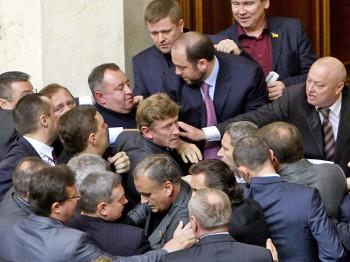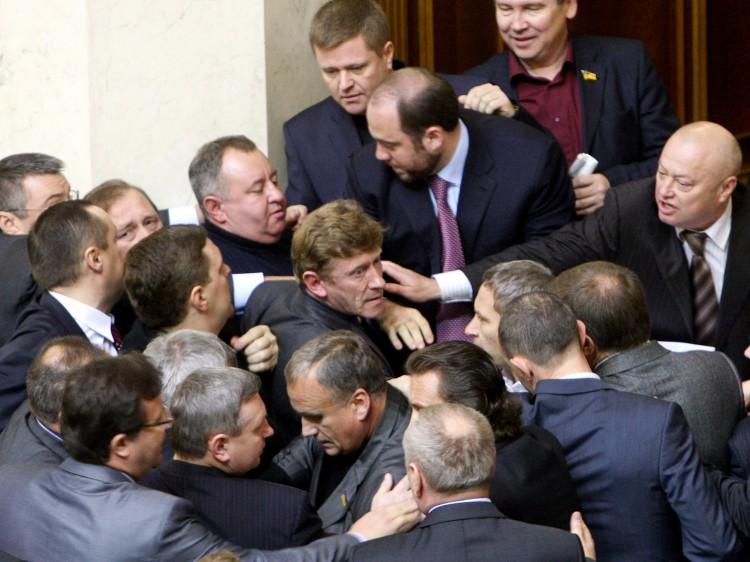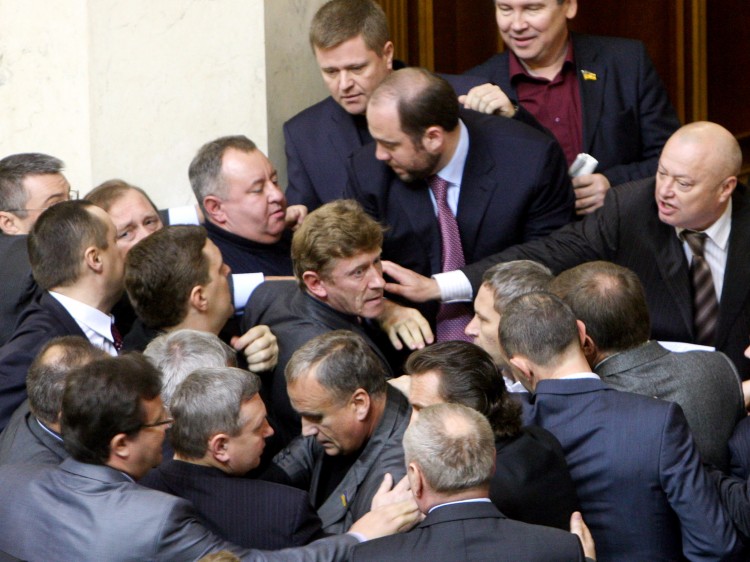Last year the country transitioned from the democratic pro-western government of Victor Yushchenko, to an authoritarian Russian-leaning government led by Viktor Yanukovych and the Ukrainian national Parliament has been a center of political conflict with disagreements among parliamentarians turning to fisticuffs.
Last month in Kyiv, the presiding lawmaker at chamber session of Parliament, Communist Party member Adam Martynuk, grabbed his deputy, Oleg Lyashko, by the throat and throttled him to the floor.
The cause of the outburst was that Martynuk was upset at a remark Lyashko made after Martynuk refused to let him speak to the parliament.
In another incident last year, when the Ukrainian Parliament approved a controversial plan to allow the Russian navy to extend its stay on the Crimea Peninsula by 25 years in exchange for lower prices on Russian gas; the session was thrown into chaos when opposition lawmakers began hurling eggs and smoke bombs.
Ukrainian politicians are also notorious for not showing up to sessions of parliament and under current Ukrainian law, members of parliament are allowed to vote for absent members.
Reforms Refused
Some lawmakers have tried to implement measures to correct the unethical behavior of parliamentarians, but so far none of their proposed measures have gained support from Parliament.
A bill aimed at regulating the conduct of Ukrainian Parliament members, proposed by Parliament member Yuriy Gnatkevych, stalled in the profile committee on the grounds that legislators should not have to abide by the measures due to their parliamentary status.
In his next attempt, Gnatkevych wrote another bill proposing cuts to lawmakers’ pay if they do not attend sessions of parliament; that bill was also never debated.
Parliament member Vladimir Lytvyn proposed a system that would make it illegal for lawmakers to vote for absent members by requiring legislators to keep their fingers on the voting buttons until voting is over. Another lawmaker also proposed that those who vote more than once be held criminally responsible.
The governing coalition, of which the majority is the president-backed Party of Regions, has refused to support the reform measures claiming that it would cause a stalemate in Parliament and no bills would be passed.
“This party [of Regions] will never vote for such measures as it represents interests of big business in the country,” Gnatkevych said in an interview, adding that there are about 20 members who don’t come to parliament. “The most interesting thing currently is that our legal system allows such things to happen,” he added.
In the last year Yanukovych has made many changes including returning the country to it’s 1996 Constitution, which extends presidential powers. There are also concerns that Ukraine’s press freedom is eroding in the new leadership.
The parliamentary Party of Region faction includes the country’s most influential businessman, Renat Achmetov; President Yanukovych’s son; and Vladimir Derkach, one of the owners of the country’s power industry. These members are among those who rarely attend parliamentary sessions.
Continued on the next page ... changes need to be made
Conduct Observations
In February, the poor functioning of the Ukrainian Parliament was highlighted when Polish lawmakers visited Kyiv. The Polish took pictures and laughed as they watched the Ukrainian lawmakers scurry around to push as many voting buttons as they could.
After the session, the Polish lawmakers told reporters that if such actions happened in Poland, a parliamentarian would end up in court with his mandate annulled.
The head of Kyiv-based Democratic Initiatives Foundation (DIF), Irina Bekeshkina, said that changes need to be made to lawmaker’s operating protocol.
“To resolve this phenomenon [of multiple voting], some changes need to be made to the laws that regulate lawmakers’ work.
However, Bekeshkina said that the current laws on the books make it nearly impossible to change lawmaker’s protocol.
“But such changes will never be made as our legislators openly say that if they follow the law explicitly, Parliament will be paralyzed,” she said.
The main problem with the system of parliamentary elections is that it uses a closed list of candidates that only allows voters to vote for political parties instead of individual candidates.
Changing to a majority system that would allow voting for candidates has recently been hotly debated and it is still undetermined which electoral system will be used in the upcoming parliamentary elections in 2012.
Gnatkevych said it is unlikely that the majority system will be approved because Parliament does not follow those “who are intelligent, patriotic and responsible, but those who have more money.”
Public Disapproval
The Ukrainian Parliament is commonly viewed as ineffective and immoral by Ukrainians, and especially so by retired people whose low pensions are a sore point. The older folks could spark in a moment over sensitive topics such as pensions or other welfare services because most get low pensions and low level services.
Bekeshkina said that a DIF survey on Parliament’s functionality, found that more than half of respondents have a negative image of lawmakers and say they should be fired.
Gnatkevych, who says that he generally attends sessions of Parliament and who was one of the first parliamentarians in independent Ukraine after the Soviet Block collapsed in 1991, said it is hard to say why Ukrainian lawmakers conduct themselves so poorly, but that their actions have a hugely deleterious impact on society.






